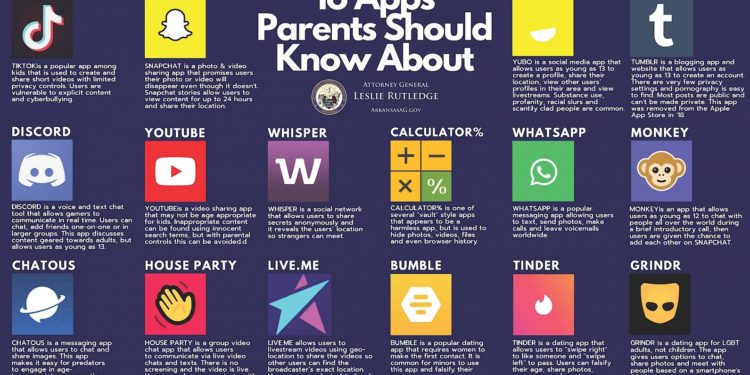Attorney General Leslie Rutledge is sending an important warning for parents to take time to monitor their child’s internet usage and social media accounts. Social media sites are a valuable resource for learning and connecting with others, but these platforms also enable bullying, anonymous messaging and exploitation of children by criminals.
“While technology can be an invaluable resource for learning, it can also expose your child to criminal or inappropriate activity,” said AG Rutledge. “It is important that we all take the necessary steps to protect our most precious Arkansans from those who want to do them harm.”
AG Leslie Rutledge urges parents to familiarize themselves with these phone apps that may make children vulnerable to dangers online:
• Bumble — Bumble is a popular dating app that requires women to make the first contact. It is common for minors to use this app and falsify their age.
• Chatous — Chatous is a messaging app that allows users to chat and share images. This app makes it easy for predators to engage in age-inappropriate conversations with potential victims.
• Discord — Discord is a voice and text chat tool that allows gamers to communicate in real-time. Users can chat and add friends one-on-one or in larger groups. This app discusses content geared toward adults but allows users as young as 13.
• Grindr — Grindr is a dating app for LGBTQ adults, not children. The app gives users options to chat, share photos and meet with people based on a smartphone’s GPS location.
• Houseparty — Houseparty is a group video chat app that allows users to communicate via live video chats and texts. There is no screening, and the video is live. Users can also communicate with people they do not know.
• Live.Me — Live.Me allows users to livestream videos using geo-location to share the videos so other users can find the broadcaster’s exact location. Users can earn “coins” to “pay” minors for photos.
• Monkey — Monkey is an app that allows users as young as 12 to chat with people all over the world during a brief introductory call, then users are given the chance to add each other on Snapchat.
• Phony Calculator App — Most phones have a calculator. However there are many third party calculator apps that actually serve as a “vault” where the user can hide photos, videos, files and even browser history data.
• Snapchat — Snapchat is a photo and video sharing app that promises users their photo or video will disappear even though it does not. Snapchat stories allow users to view content for up to 24 hours and share their location.
• TikTok — TikTok is a popular app among kids that is used to create and share short videos with limited privacy controls. Users are vulnerable to explicit content and cyberbullying.
• Tinder — Tinder is a dating app that allows users to “swipe right” to like someone and “swipe left” to pass. Users can falsify their age, share photos, message and meet.
• Tumblr — Tumblr is a blogging app and website that allows users as young as 13 to create an account. There are very few privacy settings and pornography is easy to find. Most posts are public and cannot be made private.
• WhatsApp — WhatsApp is a popular messaging app allowing users to text, send photos, make calls and leave voicemails worldwide.
• Whisper — Whisper is a social network that allows users to share secrets anonymously, and it reveals the users’ location so strangers can meet.
• Yik Yak — Yik Yak is a social media app that allows an individual to anonymously chat with other app users within a five-mile radius. Due to its anonymous nature, bullying, sexually explicit or other graphic content is often encountered on the platform.
• YouTube — YouTube is a video sharing app that may not be age appropriate for kids. Inappropriate content can be found using innocent search terms, but with parental controls this can be avoided.
• Yubo — Yubo is a social media app that allows users as young as 13 to create a profile, share their location, view other users’ profiles in their area and view livestreams. Substance abuse, profanity, racial slurs and scantily clad people are common.
Parents should follow the following tips to monitor their child’s online activity:
• Talk to children about sexual victimization and the potential of online danger.
• Keep the computer or laptop in a common room of the house, not in a child’s bedroom.
• Utilize parental controls available from internet service providers or use blocking software.
• Always maintain access to a child’s online account and monitor text, email and other message inboxes.
• Teach children the responsible use of online resources.
• Familiarize yourself with computer safeguards being utilized at school, the library and at friends’ homes.
• Never automatically assume that what a child is told online is true.
Arkansans can report child exploitation by calling the National CyberTipline at (800) 843-5678 or visit CyberTipline.com. In the event of an emergency, dial 911 or call local law enforcement.

